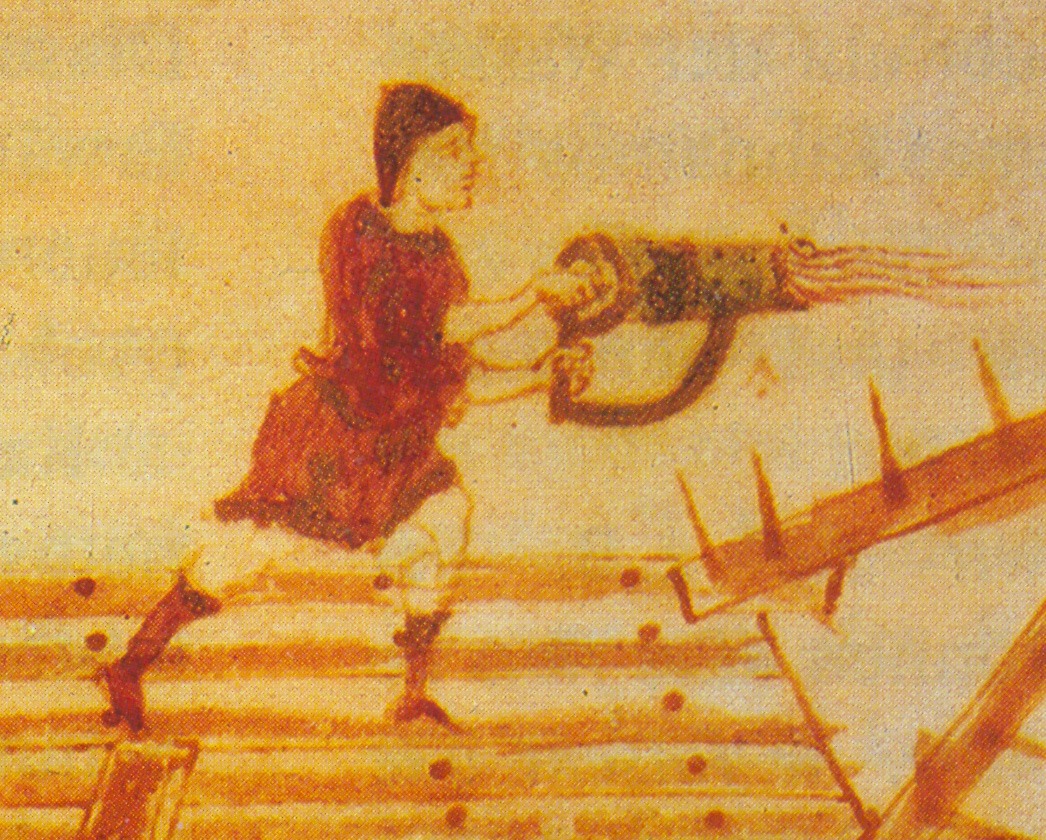Greek fire, an incendiary weapon that conjures images of ancient naval battles and fiery destruction, remains one of history’s most intriguing military secrets. Developed around the 7th century by the Byzantine Empire, Greek fire played a crucial role in warfare, particularly in naval engagements. This article delves into the enigmatic world of Greek fire, exploring its origins, composition, and the tactical advantage it provided in combat.
The exact formula of Greek fire has been lost to time, shrouded in secrecy, and protected by the Byzantines for centuries. Its ability to burn on water and its resistance to being extinguished made it a weapon of terror and a subject of fascination. We will explore the historical accounts of Greek fire in action, its impact on the balance of naval power in the Mediterranean, and the attempts to uncover the mystery of its composition.
What is the Greek Fire?

Greek fire, a formidable incendiary weapon of the ancient world, was the Byzantine Empire’s closely guarded military secret. Developed in the 7th century, this weapon had a reputation for instilling fear and wreaking havoc among enemy fleets, playing a pivotal role in Byzantine naval dominance.
The Composition of Greek Fire
The exact composition of Greek fire remains one of history’s great mysteries. It is believed to have been a combination of several substances, possibly including sulfur, naphtha, and quicklime. What set Greek fire apart was its ability to continue burning even on water, making it exceptionally effective during naval battles. Attempts to recreate it based on historical texts have been largely speculative, as the Byzantines successfully concealed its formula for centuries.
Deployment in Warfare
Greek fire was primarily used in naval warfare, deployed through specially designed tubes called siphons mounted on Byzantine ships. These siphons would project the fiery substance onto enemy ships, causing severe damage and often resulting in uncontrollable fires. The sight of Greek fire in action was said to be terrifying, with contemporary accounts describing it as a sea of fire.
Another method of deployment was in hand-held grenade-like containers thrown onto enemy ships or troops. The psychological impact of Greek fire was immense, as it could not be easily extinguished with water, leaving adversaries in a state of panic and confusion.
Tactical Advantages
The strategic advantages of Greek fire were significant. It provided the Byzantines with a powerful defensive tool, especially in protecting Constantinople, their capital, during sieges. The weapon’s effectiveness in naval battles helped secure Byzantine dominance in the Mediterranean Sea for many years.
A Tool of War and Deterrence
Beyond its immediate destructive capability, Greek fire was also a tool of psychological warfare and deterrence. The fear it instilled in enemies often led to hesitation and retreat, making it a powerful asset in the Byzantine military arsenal.
Who Invented the Greek Fire?
The origins of Greek fire, one of the most enigmatic weapons of the ancient world, are as mysterious as its composition. While the precise details of its invention are lost to history, it is widely attributed to a figure associated with the Byzantine Empire in the 7th century.
The Byzantine Creation
Greek fire was introduced during the reign of Byzantine Emperor Constantine IV and is often credited to a Syrian engineer named Kallinikos (or Callinicus), who fled to Constantinople from Heliopolis, now part of modern-day Lebanon. According to historical accounts, Kallinikos played a crucial role in either developing or refining the formula for Greek fire, a secret that the Byzantines guarded fiercely.
The Role of Kallinikos
The involvement of Kallinikos, as reported by chroniclers of the time, suggests that he was instrumental in turning Greek fire into a practical weapon of war. It is believed that he might have built upon existing chemical knowledge and military technology to create this formidable substance. However, the lack of concrete historical records leaves room for speculation and debate regarding his exact contribution.
A State Secret
Regardless of its exact inventor, Greek fire was a closely guarded state secret of the Byzantine Empire. Its formula was a mystery that the Byzantines successfully kept hidden from their enemies, contributing to its legendary status. This secrecy was so well-maintained that, over time, the knowledge of how to produce Greek fire was lost even to the Byzantines themselves.
Legacy of the Inventor
The inventor of Greek fire, whether it was Kallinikos or another unsung hero of the Byzantine era, left a lasting legacy in the annals of military history. This creation was not only a technological marvel of its time but also a game-changer on the battlefield, contributing significantly to the naval dominance of the Byzantine Empire for centuries.
Conclusion
Greek fire remains one of history’s most intriguing military enigmas. This incendiary weapon, which played a crucial role in the naval dominance of the Byzantine Empire, has captivated historians and scientists for centuries. Despite numerous attempts to unravel its secrets, the exact composition and method of deployment of Greek fire continue to elude modern understanding, adding to its mystique and legend.
The legacy of Greek fire extends beyond its tactical use in warfare. It represents a remarkable achievement in chemical and military technology during the medieval period, showcasing the ingenuity and resourcefulness of the Byzantines. Greek fire’s ability to burn on water and its resistance to being extinguished was revolutionary for its time, setting it apart from other weapons of the era.